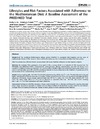Please use this identifier to cite or link to this item:
https://accedacris.ulpgc.es/jspui/handle/10553/21149
| Title: | Lifestyles and Risk Factors Associated with Adherence to the Mediterranean Diet: A Baseline Assessment of the PREDIMED Trial | Authors: | Hu, Emily A. Toledo, Estefanía Díez-Espino, Javier Estruch, Ramón Corella, Dolores Salas-Salvadó, Jordi Vinyoles, Ernest Gómez-Gracia, Enrique Arós, Fernando Fiol, Miquel Lapetra, José Serra-Majem, Lluis Pinto, Xavier Puy-Portillo, M. Lamuela-Raventós, R.M. Ros, Emilio Sorlí, José V. Martínez-González, Miguel Ángel |
UNESCO Clasification: | 3206 Ciencias de la nutrición | Keywords: | Mediterranean diet, lifestyles, risk factors | Issue Date: | 2013 | Journal: | PLoS ONE | Abstract: | Background: The traditional Mediterranean dietary pattern (MedDiet) is associated with longevity and low rates of cardiovascular disease (CVD). However, there is little information on who is more likely to follow this food pattern.Aim: To evaluate how different factors are associated with lower MedDiet adherence in older Spanish subjects.Methods: We included 7305 participants (men aged 55-80 y, women 60-80 y) at high-risk of CVD recruited into the PREDIMED trial (ISRCTN35739639). Socioeconomic, anthropometric, lifestyle characteristics and CVD risk factors were recorded. A validated 14-item questionnaire was used to evaluate MedDiet adherence at baseline. Multivariate models were used to estimate odds ratios (OR) and 95% confidence intervals for lower adherence to the MedDiet (<9 points out of 14) and ascertain factors independently associated with it.Results: Former smoking (OR = 0.87; 95% CI, 0.78-0.98), physical activity (OR for the 3rd vs. the 1st tertile: 0.69; 0.62-0.78), and higher educational level (OR for university vs. less than primary school: 0.54; 0.38-0.77) were associated with higher MedDiet adherence. Conversely, having a larger waist-to-height ratio (OR for 0.1 units, 1.35; 1.22-1.49), being diabetic (OR = 1.13; 1.03-1.24), being single (OR = 1.27; 1.01-1.61) or divorced or separated (OR = 1.44; 1.09-1.89), and current smoking (OR = 1.28; 1.11-1.47) were associated with lower adherence.Conclusions: Participants with little education, a larger waist-to-height ratio, or diabetes and those who were less physically active, single, divorced or separated, or smokers were less likely to adhere to the MedDiet, an ideal model for food choices. Stronger efforts of health promotion are needed in these groups to foster adoption of the MedDiet. | URI: | https://accedacris.ulpgc.es/handle/10553/21149 | ISSN: | 1932-6203 | DOI: | 10.1371/journal.pone.0060166 | Source: | PLoS ONE [ISSN 1932-6203], v. 8 (4):e60166 | Rights: | by-nc-nd |
| Appears in Collections: | Artículos |
SCOPUSTM
Citations
90
checked on Jun 8, 2025
WEB OF SCIENCETM
Citations
87
checked on Jan 25, 2026
Page view(s)
71
checked on Jan 23, 2024
Download(s)
119
checked on Jan 23, 2024
Google ScholarTM
Check
Altmetric
Share
Export metadata
Items in accedaCRIS are protected by copyright, with all rights reserved, unless otherwise indicated.
